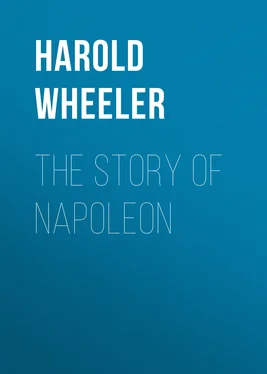Harold Wheeler - The Story of Napoleon
Здесь есть возможность читать онлайн «Harold Wheeler - The Story of Napoleon» — ознакомительный отрывок электронной книги совершенно бесплатно, а после прочтения отрывка купить полную версию. В некоторых случаях можно слушать аудио, скачать через торрент в формате fb2 и присутствует краткое содержание. Жанр: foreign_prose, История, foreign_edu, foreign_antique, на английском языке. Описание произведения, (предисловие) а так же отзывы посетителей доступны на портале библиотеки ЛибКат.
- Название:The Story of Napoleon
- Автор:
- Жанр:
- Год:неизвестен
- ISBN:нет данных
- Рейтинг книги:4 / 5. Голосов: 1
-
Избранное:Добавить в избранное
- Отзывы:
-
Ваша оценка:
- 80
- 1
- 2
- 3
- 4
- 5
The Story of Napoleon: краткое содержание, описание и аннотация
Предлагаем к чтению аннотацию, описание, краткое содержание или предисловие (зависит от того, что написал сам автор книги «The Story of Napoleon»). Если вы не нашли необходимую информацию о книге — напишите в комментариях, мы постараемся отыскать её.
The Story of Napoleon — читать онлайн ознакомительный отрывок
Ниже представлен текст книги, разбитый по страницам. Система сохранения места последней прочитанной страницы, позволяет с удобством читать онлайн бесплатно книгу «The Story of Napoleon», без необходимости каждый раз заново искать на чём Вы остановились. Поставьте закладку, и сможете в любой момент перейти на страницу, на которой закончили чтение.
Интервал:
Закладка:
As regards authorities, special reference must be made to Volume IX. of the monumental “Cambridge Modern History,” Dr J. Holland Rose’s just and impartial “Life of Napoleon I.,” Sir John Seeley’s somewhat disparaging “Short History of Napoleon the First,” Mr F. Loraine Petre’s masterly studies of the Polish, Prussian, and Austrian campaigns, Sir Archibald Alison’s “History of Europe,” which has by no means lost its usefulness since more modern research has added to our knowledge of the epoch, Mr Oscar Browning’s interesting “Boyhood and Youth of Napoleon, 1769–1793,” and Mr Hereford B. George’s “Napoleon’s Invasion of Russia.” A host of other volumes dealing with the same inexhaustible subject which line the shelves of my crowded library have also been utilised, I trust, to good purpose.
When the late Admiral Eden was a senior midshipman he was told by his Admiral that he should accompany him on a visit to the fallen Emperor at St Helena. “We waited for Napoleon in an outer room,” he afterwards told a friend, “and you must imagine how eagerly I expected his entrance. The door was thrown open at last, and in he came. He was short and fat, and nothing very attractive but for his eye! My word, sir, I had never seen anything like it.
“After speaking to the Admiral he turned to me, and then I understood for the first time in my life, what was the meaning of the phrase ‘A born ruler of men.’ I had been taught to hate the French as I hated the devil; but when Napoleon looked at me there was such power and majesty in his look that if he had bade me lie down that he might walk over me, I would have done it at once, Englishman although I was. The look on Napoleon’s face was the revelation of the man and the explanation of his power. He was born to command.”
And there you have part of the secret of Napoleon’s career.
HAROLD F. B. WHEELERCHAPTER I
Napoleon the Boy
(1769–1778)
Whenever we hear the name of Napoleon mentioned, or see it printed in a book, it is usually in connection with a hard-fought victory on the battlefield. He certainly spent most of his life in the camp, and enjoyed the society of soldiers more than that of courtiers. The thunder of guns, the charge of cavalry, and the flash of bayonets as they glittered in the sun, appealed to him with much the same force as music to more ordinary folk. Indeed, he himself tells us that “the cries of the dying, the tears of the hopeless, surrounded my cradle from the moment of my birth.”
We are apt to forget that this mighty conqueror, whom Carlyle calls “our last great man,” had a childhood at all. He was born nearly a century and a half ago, on the 15th August 1769 to be exact, in the little town of Ajaccio, the capital of picturesque Corsica. This miniature island rises a bold tree-covered rock in the blue waters of the Mediterranean, fifty miles west of the coast of Italy. It had been sold to France by the Republic of Genoa the previous year, but the inhabitants had fought for their independence with praiseworthy determination. Then civil war broke out, and the struggle finally ended three months before the birth of the boy who was to become the ruler of the conquering nation. The Corsicans had their revenge in time, although in a way very different from what they could have expected.
Letizia Bonaparte, Napoleon’s mother, was as beautiful as she was energetic, and her famous son never allowed anyone to speak ill of her. “My excellent mother,” said he, not long before his death, “is a woman of courage and of great talent … she is capable of doing everything for me,” and he added that the high position which he attained was due largely to the careful way in which she brought him up.
“It is to my mother, to her good precepts and upright example, that I owe my success and any great thing I have accomplished,” he averred, while to a general he remarked, “My mother was a superb woman, a woman of ability and courage.” A truly great man always speaks well of his mother.
Napoleon was Letizia’s fourth child, two having died in infancy, while Joseph, the surviving son, was still unable to toddle when the latest addition to the family was in his cradle. His father was a happy-go-lucky kind of man of good ancestry, a lawyer by profession, who on the landing of the French had resigned the pen for the sword. He enlisted in the army raised by Pascal Paoli to defend the island, for the Corsicans were then a very warlike people and much sought after as soldiers, and it is supposed by some that he acted as Paoli’s secretary. It is certain that the patriot showed him marked favour, which was never repaid.
When Paoli and his loyal band were forced to make their escape to the hospitable shores of England, Charles Bonaparte meekly accepted the pardon offered to those who would lay down their arms and acknowledge Louis XV. of France as their King. After events proved the wisdom of his choice, but scarcely justified his action.
The house in which the Bonaparte family lived at Ajaccio is still standing, but has been patched up and repaired so frequently that probably little of the original fabric remains. It now belongs to the ex-Empress Eugénie, the consort of Napoleon’s ill-fated nephew who is known to history as Napoleon III. You would not call it a mansion, and yet it contains a spacious ballroom, a large square drawing-room, Charles Bonaparte’s study, a dining-room, a nursery, several bedrooms, and a dressing-room. Some of the old furniture is left, namely the Chippendale sofa on which the future Emperor was born, his mother’s spinet, and his father’s desk. There is also a little etching of Napoleon on horseback by the late Prince Imperial, and one or two statuettes and portraits. In the Town Hall near by is a picture of Letizia which testifies to her good looks—she was known as “the beauty of Ajaccio!”
As a child Napoleon was impetuous, self-confident, and apt to be bad-tempered. If a playmate did something which displeased him the culprit was rewarded with kicks, bites and scratches. Letizia did her best to break him of this bad habit, with little success, for he resented interference to the end of his days. When he was Emperor he used to tell an anecdote of his early life which proves that his mother did more than scold him when he got into mischief.
There were some fig-trees in the garden attached to his home, and Napoleon was very fond of climbing them. Letizia, fearing an accident, forbade him to do so. “One day, however,” he relates, “when I was idle, and at a loss for something to do, I took it in my head to long for some of those figs. They were ripe; no one saw me, or could know anything of the matter. I made my escape, ran to the tree, and gathered the whole. My appetite being satisfied, I was providing for the future by filling my pockets, when an unlucky gardener came in sight. I was half-dead with fear, and remained fixed on the branch of the tree, where he had surprised me. He wished to seize me and take me to my mother. Despair made me eloquent; I represented my distress, promised to keep away from the figs in future, and he seemed satisfied. I congratulated myself on having come off so well, and fancied that the adventure would never be known; but the traitor told all. The next day my mother wanted to go and gather some figs. I had not left any, there was none to be found: the gardener came, great reproaches followed, and an exposure.” The result was a thrashing!
Probably the busy housewife taught Napoleon his letters, assisted by his uncle Joseph Fesch, who was but six years his senior, while from his great uncle, Archdeacon Lucien Bonaparte, he learned a little Bible history. The three “R.’s” were drilled into him by nuns, and as the establishment admitted girls as well as boys, Napoleon took a fancy to one of the former, thereby incurring the ridicule of some of his schoolfellows. They were never tired of jeering at him with a little rhyme, specially composed for the occasion, to the effect that “Napoleon with his stockings half off makes love to Giacommetta.” The translation, of course, does not jingle as in the Corsican patois. It must not be inferred that he was a good-looking or attractive boy. On the contrary, he had a sallow complexion, was invariably untidy, and inclined to be moody.
Читать дальшеИнтервал:
Закладка:
Похожие книги на «The Story of Napoleon»
Представляем Вашему вниманию похожие книги на «The Story of Napoleon» списком для выбора. Мы отобрали схожую по названию и смыслу литературу в надежде предоставить читателям больше вариантов отыскать новые, интересные, ещё непрочитанные произведения.
Обсуждение, отзывы о книге «The Story of Napoleon» и просто собственные мнения читателей. Оставьте ваши комментарии, напишите, что Вы думаете о произведении, его смысле или главных героях. Укажите что конкретно понравилось, а что нет, и почему Вы так считаете.












